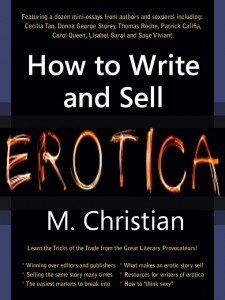“The assassin readied himself, beginning first by picking up his trusty revolver and carefully threading a silencer onto the barrel.”
That reads right enough, doesn’t it? You look at it and it sings true. But it’s not. Not because the assassin is a product of my imagination but because, except for one very rare instance, silencers cannot be fitted onto revolvers. So every time you see Mannix or Barnaby Jones facing off against some crook with a little tube on the end of their revolver, keep in mind that it has no bearing on reality.
What does this have to go with smut writing? Well, sometimes erotica writers—both old hands and new blood—make the same kind of mistakes: not so much a revolver with a silencer, but definitely the anatomical or psychological equivalent.
People ask me sometimes what kind of research I do to write erotica. The broad answer is that I seriously don’t do that much true research, but I do observe and try and understand human behavior— no matter the interest or orientation—and add that to what I write. But that doesn’t mean that there isn’t some (ahem) fieldwork involved.
I’m very lucky to have started writing erotica here in San Francisco. If America has a sexual organ, it’s here. Good example: do you know what the most-attended parade is in the US? Answer: The Rose Parade in Pasadena. No surprise there, right? Well, here’s one: do you know the second most-attended parade? It’s the San Francisco Lesbian/Gay/Bisexual/Trans-gendered Day Parade. There are 500,000 people—some gay and some not, all cheering for love and sex. It’s more than mind-blowing; it’s truly inspiring. It also shows how sexy this burg is. I should also mention the Folsom Street Fair: 400,000 leather- and latex-clad men, women, and genderqueers thronging through seven blocks of the city.
Sex is not just in the atmosphere here; it’s also a tradition. The Institute for the Study of Human Sexuality is here, and SFSI is here. SFSI stands for San Francisco Sex Information, a completely self- funded sex information and referral system. It works like this: after 52 hours of training (doctors get only something like 15), volunteers are qualified to go on the switchboard and answer questions from all over the country on any aspect of human sexuality without judgment, bias, or giggles. If you call (415) 989-7374 one of these volunteers will answer whatever you ask, or put you in contact with another group who will. It’s a wonderful service and an invaluable resource. You can also check them out at www.sfsi.org.
It’s easy to make the assumption that you’re well informed, but the fact is we are being bombarded by prejudice and simply inaccurate information all the time. The media is getting better at depicting sexuality, but they still have a long way to go. Way too often I’ll read a book, watch a movie, or flip channels, and groan at some cliché being perpetuated: all gay men are effeminate, all lesbians are butch, S/M is destructive, polyamorous people are sex-addicted, older people don’t have sex, couples always orgasm together—the list goes on and on. Many of these things are done out of laziness—but others are repetition of what the creators honestly believe are true.
It’s a very hard to unlearn something you’ve always taken as truth, and even harder to recognize what’s in your personal worldview that needs to be reexamined. My advice is to assume, especially in regards to sexuality, that everything you know should be looked at again. If you’re right, then the worst you can do is perhaps add a bit more to your knowledge, or get a different perspective. But if you crack open a book, or blip to a Web site, and find yourself going “I didn’t know that,” then feel good rather than bad: by doing that, and adding it to your erotic fiction, you’ll help perpetuate accuracy rather than bullcrap.
One more thing you could do is help people. We don’t like sex in this country. Sure, we sell beer and cars with it, but we don’t like it. We’re scared of it. Living in this world with anything that’s not beer and car commercial sexuality can be a very frightening and lonely experience. Too many people feel that they are alone, or what they like to do sexually is wrong, sinful, or sick. Now I’m not talking about violent or abusive sexual feelings, but rather an interest in something that harms no one and that other people have discovered to be harmless or even beneficial. If you treat what you’re writing about with respect, care, and understanding, you could reach out to someone, somewhere and help them understand and maybe even get through their bad feelings about their sexuality—bad feelings, by the way, that more than likely have been dished out by the lazy and ignorant for way too long.
In other words, especially in regards to erotica, you should be part of the solution and not the problem.












Recent Comments